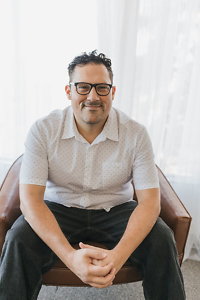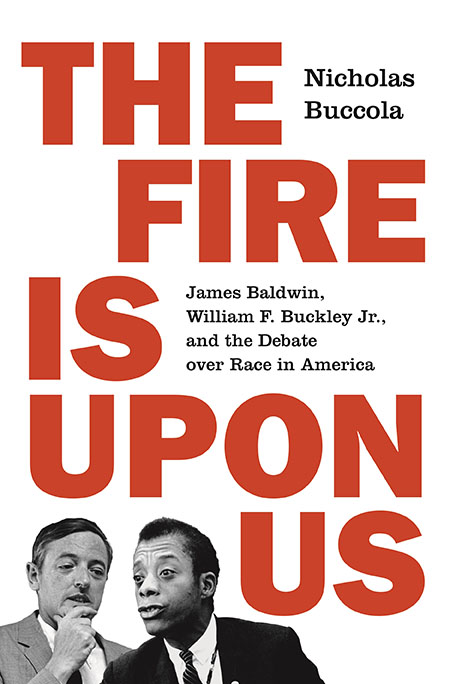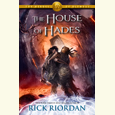Beloved America
David Dark talks with Chapter 16 about choosing our own spiritual ancestors
In his latest book, The Possibility of America, Nashville author David Dark takes a harder look at Christianity as America lives it and boldly calls for repentance. Revisiting the social and religious trends of his provocative 2005 book, The Gospel According to America, and analyzing even more dangerous political rhetoric, Dark challenges the “white nationalist death cults” that too often masquerade as Christians and the complacent fence-sitters who enable them.
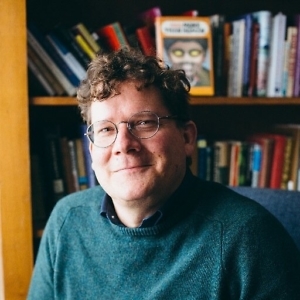 Dark’s clarion call is inspired by a vision of the Beloved Community, a dream that has grounded various marginalized and activist communities since the civil-rights movement. It is, according to W.E.B. Dubois, “a gift of the spirit, a communion within which we come to know and hear ourselves in relationship to others.”
Dark’s clarion call is inspired by a vision of the Beloved Community, a dream that has grounded various marginalized and activist communities since the civil-rights movement. It is, according to W.E.B. Dubois, “a gift of the spirit, a communion within which we come to know and hear ourselves in relationship to others.”
Dark answered questions from Chapter 16 via email.
Chapter 16: This book covers similar ground as that of your first book, The Gospel According to America. What made you return to this subject fourteen years later?
David Dark: Well, for one thing, my publisher called to say they wanted to see it happen. They felt, and I agreed, that the cult of denial I tried to describe and somehow engage on the first try has only grown more powerful among us. While I could spy an awful lot within the original text that struck me as prescient, I also saw plenty that felt terribly naïve. If you can believe it, I honestly thought my little effort could serve to swing an election or two in a more righteous direction. The beginning of the Obama presidency had me thinking that, to some degree, the alarm I’d sounded was a little overwrought. I believed we’d turned a corner and that one form of madness that seemed to seize so much of the American psyche was behind us.
Turns out I didn’t know the half of it. I also had yet to see how “white supremacy” named so much of what I was trying to call attention to in an unhelpfully generalized way. I wanted to pull it into our moment and beyond. Facebook and Twitter were in no way on my radar in 2004 and 2005. I didn’t want to risk dating it all over again, but I thought a meditation on the ways we allow our own intuitions—the very possibility of moral realization—to get hijacked by news feeds could be a welcome addition woven in throughout. I wanted to revamp it so meaningfully that it might constitute a prophetic challenge to what I suppose we’ll call, for now, the Trump era, and a deep contribution to rightly conceiving the witness of Jesus and other prophets of Beloved Community in our radioactive days. I did my best.
Chapter 16: You are writing generally to all citizens of a God-haunted America but have a particular empathy for and challenge to disillusioned evangelicals. How has your audience responded to the call to change the script on what a blessed country looks like?
Dark: When it comes to this one book, I suspect it’s too early to tell. I know people read and engage my tweets (which is intensely gratifying), but I’m a little unsure as to who has or will read my book all the way through. If “evangelical” is mostly shorthand for “white nationalist death cult,” I welcome and hope to hasten the disillusionment. I suppose I’m trying to talk such folks (disillusioned evangelicals) out of the idea that bigots own the meaning of the Bible. It’s something of a hard sell because people are often too hurt to want to go deeper. The even harder sell is that nobody’s just a bigot. To love a person is a process. A country too. Both take time.
Chapter 16: For the American who seeks to be both a Christian and a patriot, why is the Beloved Community a better image than the City on a Hill?
Dark: I think City on a Hill, a little like Kingdom of God, has proved too easily deployed to underwrite white-supremacist legislation. Both are wonderful and sacred in their way so long as they aren’t used to shut down the question of what lived righteousness looks like. Beloved Community is a phrase I picked up from John Lewis. It includes everyone interested in entering into the work of moral seriousness between human beings and even those who aren’t yet interested.
Beloved Community names the hope that those too estranged from their best selves to receive real hospitality and an accompanying sense of responsibility might enter into community someday anyway. Beloved Community is one way of fleshing out the idea that America itself is a long, sometimes righteous, sometimes catastrophic argument over what people owe each other.
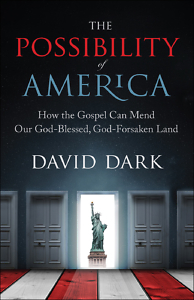 Chapter 16: Your scholarly writing elevates the revelation of popular culture, including film and music, and your Twitter feed is peppered with religious language. How do you bridge the reference gap?
Chapter 16: Your scholarly writing elevates the revelation of popular culture, including film and music, and your Twitter feed is peppered with religious language. How do you bridge the reference gap?
Dark: I hope I bridge the gap by eloquently ignoring it. I think religion is the moral memory of humankind whether it comes to us in the form of a parable, a lyric, or an image. The division between the secular and the sacred dissolves upon contact with the way our hearts and minds work. Whatever we take in and treasure is our own little canon, our bandwidth if you like. The question of what we allow within it is the question of what our souls look like. Bandwidth is worship space.
Chapter 16: You recently tweeted, “‘I’m not political’ is the new ‘I’m not responsible for anything happening around me.’” In Life’s Too Short to Pretend You’re Not Religious, you write about the temptation to “opt out.” How do you convince someone to opt in to either religion or politics—or both?
Dark: It’s weird. I don’t know that I’ve ever succeeded in persuading someone that nobody’s more or less political than anyone else, but it’s obvious to me. I think religion sits alongside politics and “the media” as the three most catastrophically unexamined abstractions of our time. They’re so terribly handy as forms of evasion. With them, we can blame almost everything (including our own behavior) on someone else.
There is no opting out of the fact that I’m somebody with a body, taking up space, voting for (or against) some form of culture or other at every turn. I suppose I try to convince folks by putting this assertion in the first person in the hope that someone might join me in the recognition of relationship. Fred Rogers is my model here: “We are intimately related. May we never even pretend that we are not.”
Chapter 16: You draw from a diversity of sources, but your description of the redeemed America is drawn from African American writers: Baldwin, Bambara, Thurman, and King. What makes these writers best suited for the construction of a moral vision for America?
Dark: They’re each prophets of Beloved Community. In a better world, their aphorisms would be memorized by young Americans as proverbs for citizenship. To my embarrassment, Bambara and Thurman weren’t on my radar fourteen years ago. It was actually the Rev. James Lawson who turned me onto Thurman, and Dr. Hortense Spillers recommended Bambara to me when she taught me at Vanderbilt. Spillers also gave me the Ralph Ellison line: You’re stuck with your relatives, but you get to choose your ancestors. I’ve thought harder about who I allow and really revere within my bandwidth ever since.
Chapter 16: “Fiction reminds us that we don’t know what we’re doing,” you write, and this book is full of allusions to the great American novelists. How does fiction inform your approach to religion?
Good fiction expands the space of the talkaboutable. The fiction that accomplishes this most mysteriously is what ancient sources refer to as parables. If it’s lengthy we might call it an oracle. Short or long we call it a witness. Witnesses like Melville and Toni Morrison and, if I can be permitted a non-American, James Joyce are among the voices that make it hard for me to think of “religion” as something that only sometimes enters the picture. Like Shakespeare, they never play that way. I’m following their lead when I hold to (or argue for) religion as politics under a different name. For them, spirit knows no division. Their true fiction tells me so. I’m trying to be true to their insight.
Beth Waltemath graduated with a degree in English from the University of Virginia and worked at both Random House and Hearst magazines before leaving publishing to attend Union Theological Seminary in New York City. A Nashville native, she now lives in Decatur, Georgia.


